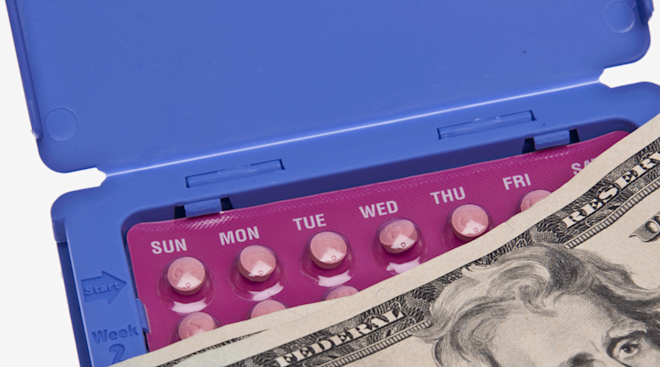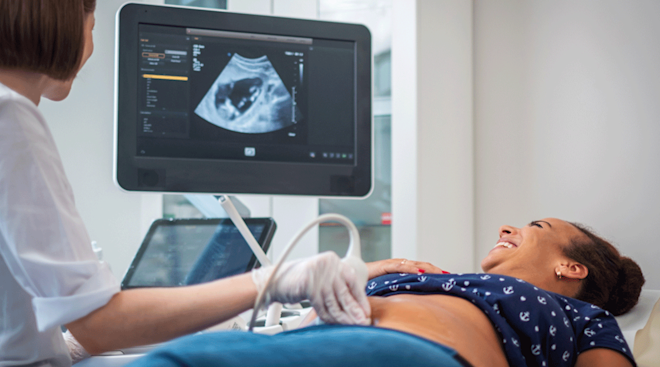Everything to Know About Your Prenatal Appointment Schedule
Over the course of your pregnancy, you might start to feel like you live at your provider’s office—and that’s actually a good thing. Studies show that moms-to-be and pregnant people who visit their providers regularly during pregnancy deliver much healthier babies on average. Your prenatal appointment schedule will of course vary depending on your provider and your own physical state, but these general guidelines should give you an idea of what to expect. Read on to learn from experts what a typical prenatal visit schedule looks like and how you can prepare.
It’s no secret that you’ll see your provider frequently during pregnancy and go through all types of tests and screenings. But exactly how often are prenatal visits scheduled? At a glance, you’ll likely have pregnancy appointments once every month (so every four weeks), between your first prenatal visit and 28 weeks of pregnancy, says Stephanie Hack, MD, ob-gyn and host of the Lady Parts Doctor podcast. Between 28 and 36 weeks, you’ll see your provider twice a month. After 36 weeks, as you get closer to delivery, that will increase to weekly—and may increase to bi-weekly after 40 weeks, Hack explains. Read on for an in-depth breakdown of the types of tests and routines to expect at each prenatal visit.
During the first (and second) trimester, there will be optional testing to look for chromosomal and genetic abnormalities. Keep in mind that these tests aren’t mandatory and may not even be recommended, depending on your individual circumstances. It’s always best to discuss what prenatal tests are beneficial specifically for you with your provider.
First prenatal appointment
When you’ll have your first prenatal appointment can vary, as it’ll depend on when you get a positive pregnancy test. Hack says the first prenatal appointment usually takes place between 8 and 12 weeks. “By this point, an ultrasound can reveal a clear image of your developing baby, showing a healthy fetus and confirming the sound of its heartbeat,” says Cary Dicken, MD, a reproductive endocrinologist and infertility specialist at RMA of NY–Long Island. Along with a possible transvaginal ultrasound, the first visit will also include:
- A full workup of your medical and family history
- A thorough physical examination
- Blood work to test for infections and anemia
- Urine analysis
- Blood pressure check
- Weigh-in
- Pap smear, depending on when your last one was
Additional tests may also be recommended, depending on your personal history and risk for complications. These include:
First trimester screen
This noninvasive optional screening is usually time sensitive and completed between weeks 11 and 13. It includes the nuchal translucency ultrasound and a blood test. Your provider will evaluate the results from both of these screenings along with your age to assess baby’s risk for certain chromosomal issues and conditions, such as Down syndrome. This screening is usually recommended in conjunction with other noninvasive testing, detailed below.
Cell-free DNA test
Also known as noninvasive prenatal testing (NIPT) or NIPS, this test is optional. Blood tests look for the most common chromosomal abnormalities that can affect pregnancy. While you can get NIPT at any age, experts usually recommend it for those over age 35. If you do opt for the testing, you can also use it to find out baby’s sex.
CVS test
Chorionic villus sampling (CVS) is another optional test that occurs between 10 and 12 weeks of pregnancy. However, this one is invasive, as it takes tissue samples from the placenta to analyze genetic information about the pregnancy, Johns Hopkins Medicine notes. The test is usually recommended for those over 35, those with a family history of genetic conditions or those with positive high-risk results from their other noninvasive prenatal screenings.
During your prenatal appointments in the second trimester, “the focus will primarily be on monitoring your ongoing progress, the growth of your baby and their development,” Dicken says. “Your provider will closely monitor key indicators such as weight and blood pressure.” You can also expect some more testing, as well as the mid-pregnancy anatomy scan. Below, what to know about your pregnancy appointments timeline for the second trimester.
Week 14 prenatal visit
During the second trimester, you’ll see your provider about every four weeks. At every appointment, you’ll have to provide a urine sample for analysis, do a weigh-in and get your blood pressure taken.
Amniocentesis
This test is optional, but it’s an almost definitive way to assess the genetic abnormalities that may be affecting your pregnancy. It’s usually done between 15 and 20 weeks of pregnancy. Like the others, amniocentesis is recommended for women over age 35 or those with a family history of genetic conditions. It’s also recommended for those with abnormal results from their quad or sequential screening, which, according to Penn Medicine, uses a subsequent blood test, combined with the results from the first trimester screening to asses overall risk of chromosal and genetic conditions.
Triple/Quad screen test
Also conducted between weeks 15 and 22, this is another optional prenatal screening that looks at the risk of the pregnancy being affected by any of the three most common genetic disorders: Down syndrome, Edwards syndrome and neural tube defects, the American Pregnancy Association notes. The screening can also look at the risk of complications such as fetal growth restriction and preeclampsia.
Mid-pregnancy anatomy scan
This scan is also sometimes called the 20-week ultrasound, but it’s important to note it can occur anytime between weeks 18 and 22, Dicken says. As the name would suggest, it tells expectant parents baby’s sex, as well as evaluates baby’s growth; the formation of baby’s internal organs; amniotic fluid levels and the location of the placenta.
Week 24 prenatal visit
You’ll have your next visit following the anatomy scan around 24 weeks. This will be a routine check-up with a weigh in, monitoring of your blood pressure and a urine analysis.
Glucose challenge screening
The glucose challenge screening occurs between weeks 24 and 28 and is used to assess the risk of gestational diabetes. During this screening, your provider will have you drink a very sweet beverage and draw your blood an hour later to check your blood glucose levels.
Glucose tolerance test
This test is normally only given if your one-hour glucose screening result is abnormal. The glucose tolerance test is longer and requires fasting for a few hours prior to your appointment. Your provider will offer you another extremely sweet drink and then draw your blood an hour later, two hours later and three hours later to assess whether or not you have gestational diabetes. If the results are positive, know the condition can be managed through diet, exercise and, if needed, medication.
You’ve reached the home stretch! As mentioned, your prenatal appointments will be a bit more frequent in the third trimester, as you’ll see your provider every two to three weeks and then weekly as you get closer to meeting baby. These appointments may also involve some new tests to monitor baby’s heart rate and overall well-being.
Week 28 prenatal visit
Your first prenatal appointment in the third trimester will be around week 28. At this visit, your provider will conduct a urine analysis, do a weigh-in, check your blood pressure and chat with you about any questions, concerns or symptoms you may have.
Nonstress test
The nonstress test is a way for your provider to assess baby’s well-being, Hack says. Not everyone gets this test though. It’s generally recommended if there’s ever decreased fetal movement or for high-risk pregnancies. You’ll have sensors attached to your belly with soft belts. These allow your provider to listen to baby’s fetal heart rate and see how it responds to baby’s movement. While the first nonstress test occurs around 28 weeks, your provider may want to repeat it later on, depending on how the pregnancy is progressing.
Week 30, 32 and 34 prenatal visits
Because your provider will be checking in with you every two to three weeks, you’ll likely have visits at weeks 30, 32 and 34. At these appointments, you’ll get weighed, do a urine test and have your blood pressure taken.
Group B strep test
Group B strep (GBS) is a bacteria that can naturally occur in the body, including the vaginal and rectal areas. While it’s typically not harmful to you, it can be harmful to baby if they’re exposed to it during a vaginal birth. For this reason, between 36 and 37 weeks, your provider will swab your vagina and rectum to screen for GBS, Dicken says. If it’s positive and you’re hoping for a vaginal birth, you may need antibiotics.
Weeks 37, 38 and 39 prenatal visit
After 36 weeks, your prenatal appointments will increase to at least weekly until childbirth. As with previous visits, you’ll get a urine test, your blood pressure checked and do a weigh-in. Hack and Dicken note your provider may also:
- Do any necessary repeat testing for sexually transmitted infections
- Perform an in-office ultrasound to look at baby’s positioning (i.e. head down, breech, etc.)
- Do a pelvic exam to evaluate cervical effacement and dilation
- Discuss your birth plan and pain management preferences
“It’s also a valuable time for you to receive guidance and information about labor, postpartum care and life with a newborn, to help you feel more prepared,” Dicken says.
Week 40 prenatal visit
By this point, you’ll no doubt be pretty eager to meet baby. You’ll get the routine examination at this visit, including a urine test, blood pressure check and weigh-in. For high-risk pregnancies, your provider may also discuss increasing your visits to monitor baby’s health with weekly or biweekly nonstress tests and ultrasounds (otherwise known as a biophysical profile. Or, they may ask you to do kick counts at home to get a sense of baby’s well-being.
How frequently you have prenatal appointments will depend on how you and baby are progressing. If there are any complications that arise, like gestational diabetes, preeclampsia or other high-risk factors, you may need to come in more frequently. “Sometimes, things might change in your pregnancy that require more attention from your healthcare provider,” Dicken says. “It could be something like a complication, or maybe just needing a bit more monitoring as you get closer to your due date.
With all the phrases, tests and symptoms thrown at you during pregnancy, it’s natural to have some (a lot) of questions—and these questions may change as your pregnancy progresses, depending on personal symptoms, circumstances and concerns. Below, some topics to keep in mind as you head into your pregnancy appointments each trimester:
- Questions for the first trimester: Hack recommends asking about nutrition, supplements and any lifestyle changes that should be made. “Make sure to discuss any pre-pregnancy health conditions you may have, or previous pregnancy complications, so you understand how they may impact your current pregnancy,” she adds. Dickens agrees, noting that you’ll also want to ask about any aspect of prenatal care you don’t understand, as well as how to manage early pregnancy symptoms.
- Questions for the second trimester: As pregnancy moves into the second trimester, experts recommend asking questions about fetal development, childbirth classes and staying active.
- Questions for the third trimester: Experts recommend asking questions about labor signs, pain management, birth plans, breastfeeding and postpartum care.
Regardless of what questions you have, Dickens stresses the importance of open and honest communication. “Ask questions that address your concerns, help you understand the progress of your pregnancy and prepare you for childbirth and postpartum.”
Frequently Asked Questions
Can you do virtual prenatal visits?
While some visits may be done over the phone or video chat, both Hack and Dicken note that when physical exams are required, the pregnancy appointments will need to be in-person.
How often do you go to the doctor when pregnant?
You’ll have monthly prenatal appointments during weeks 4 to 28, and bi-monthly appointments between weeks 28 and 36. After that, as you get closer to delivery, your provider will want to see you weekly or even more frequently. Ultimately, how often you go to your provider during pregnancy will depend on how you and baby are progressing.
When do prenatal appointments become weekly?
Prenatal appointments become weekly towards the end of pregnancy, typically after 36 weeks, Hack says.
How many postpartum visits will I have?
According to Dickens, you can expect to have at least one, but the frequency will depend on your personal circumstances surrounding birth and postpartum. Your provider should ideally contact you via phone shortly after birth, Hack notes, but the first in-person postpartum visit may not happen until 4 to 6 weeks after birth for someone without complications. For women with more complicated medical histories or birth experiences, your initial postpartum visit may be sooner. “For example, you may have a visit at two weeks postpartum after a cesarean section so that your incision may be evaluated, and then come back for your postpartum visit two to four weeks later,” Hack explains. During the postpartum visits, your provider will check in on your physical and emotional health, as well as discuss your postpartum recovery, birth control options, breastfeeding and newborn care.
While this is a good cheat sheet of what a prenatal appointment schedule typically looks like, know it “differs from person to person and even pregnancy to pregnancy,” Hack says. One of the best things you can do for your health and baby’s? “Maintain a good line of communication with your healthcare provider throughout your pregnancy,” she adds. This includes asking for clarifications, expressing concerns and raising your hand whenever something feels off.
Please note: The Bump and the materials and information it contains are not intended to, and do not constitute, medical or other health advice or diagnosis and should not be used as such. You should always consult with a qualified physician or health professional about your specific circumstances.
Cary L. Dicken, MD, is a reproductive endocrinologist and infertility specialist at RMA of NY–Long Island. She earned her medical degree from Albert Einstein College of Medicine and completed her residency at Columbia University.
Stephanie Hack, MD, MPH, is board certified ob-gyn and host of the Lady Parts Doctor podcast. She obtained her medical degree from Lewis Katz School of Medicine at Temple University, as well as a masters degree in public health. She completed her residency at Georgetown University Hospital and Washington Hospital Center.
Science and Babies: Private Decisions, Public Dilemmas, Prenatal Care: Having Healthy Babies, 1990
Johns Hopkins Medicine, Chorionic Villus Sampling (CVS)
Penn Medicine, Sequential Screening (Combined First and Second Trimester Screening)
American Pregnancy Association, Triple Screen Test
Learn how we ensure the accuracy of our content through our editorial and medical review process.
Navigate forward to interact with the calendar and select a date. Press the question mark key to get the keyboard shortcuts for changing dates.





















































